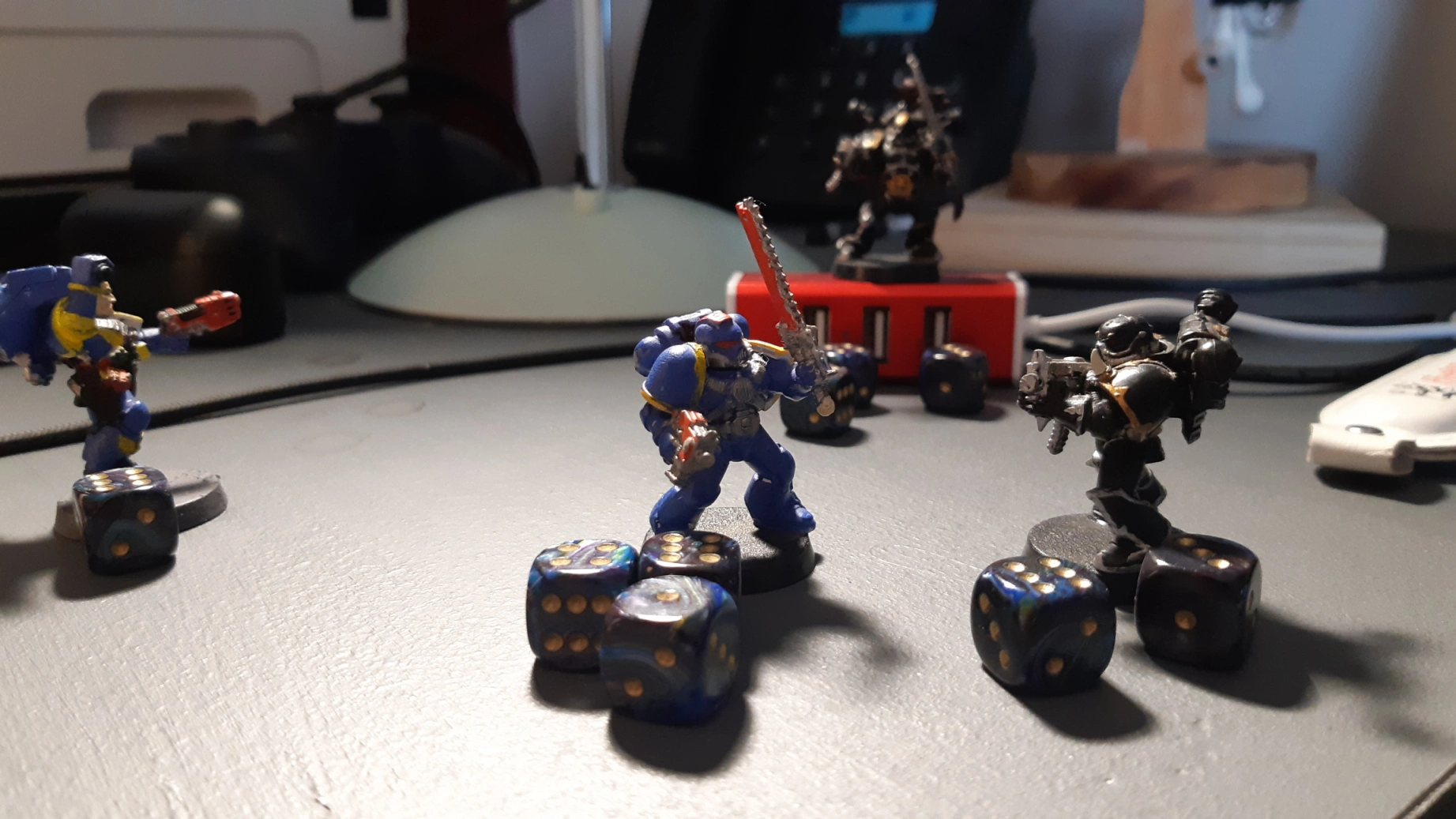I love a good tabletop game, but with few exceptions most tabletop games take at least 30 minutes to play. Wargames often take substantially longer, and even quick skirmish games can require a lot of setup. Earlier this year, I found myself wanting a really quick and simple wargame to play literally in the 7 minutes it took for my water kettle to boil. I figured it would be a great way to optimize my work to fun ratio if I could fit a wargame into the time it took me to get a fresh cup of coffee. This led to Skuffle Wammer, the universe's smallest wargame.
I regularly set up a few Warhammer or RPG miniatures on my desk at work. They usually sit just under my monitor, and I like to admire them over the course of the day. And I'll freely admit that when my computer's taking a particularly long time to compile code or run a test, I'll pick up a toy soldier and make the whooshing sounds of its jumpjets, or the blasts of its lasgun, or the hissing of its hydraulic gears. Sound effects aren't mandatory for Skuffle Wammer, but here's what is required:
- Your favourite miniatures from Games Workshop or BattleTech or Wizkids or Lego, or some other miniature creator.
- A cube of six-sided dice (such as Chessex
- A 20x20 cm play area.
- 1 to 5 minutes.
Setup
Arrange 2 or more soldiers within the play area. As you do this, decide whether the soldiers form two teams or whether they're independent agents. For instance, if you have 2 xenos and 2 Space Marines, then you probably have a xenos team and a Space Marine team. If you have a xenos, a rogue trader, a space marine, and a chaos knight, then you probably have a every-miniature-for-itself situation. This doesn't change the rules, but it will influence which miniature attacks another miniature.
- For a 5 minute game, place 3d6 next to each soldier.
- For a 3 minute game, place 2d6 next to each soldier.
- For a 1 minute game, place 1d6 next to each soldier.
The soldier closest to you goes first. The turn order proceeds by team, or clockwise when there are no teams. Turn order doesn't actually matter that much, as long as every soldier gets a turn in regular intervals.
Gameplay
On its turn, a soldier may move or attack.
To attack, remove 1d6 from a soldier's dice pool, permanently, and roll it.
- A ranged attack hits on 4 or greater.
- A melee attack hits on 3 or greater.
Damage
When a soldier takes damage, remove 1 die from its dice pool.
When a soldier's dice pool is reduced by damage to 0 or less, tip it on its side to signify that it is dead.
(Note that a soldier can run out of dice by making attacks and never taking damage. A death from lack of dice only occurs when a soldier's dice is reduced to 0 or less by taking damage.)
Here's an example:
- Garviel Lokan (from Horus Heresy) has 3 dice.
- He makes 1 attack and now has 2 dice.
- A daemon attacks him and hits, reducing his dice pool to 1.
- On his next turn, Lokan makes another attack and now has 0 dice.
Lokan isn't dead, but all he can do from this point on is move. Should he take damage, then he'll be dead because he'll have -1 dice, which qualifies as "0 or less dice from damage".
Bonus points
Grant soldiers a bonus for taking cover behind something on your desk, or for scaling to the top of your monitor to gain a better vantage point as a sniper. A bonus is either a +1 to attack, or a -1 to an attacker.

For example, Garviel Lokan has 0 dice. Should he take just one hit, he'll be dead. It's his turn, so he dives behind a USB thumbdrive, which grants him +1 defence.
A traitor marine takes a shot and rolls a 4. That's normally a hit, but Lokan is behind cover, so functionally the traitor rolled 4-1 (3), which is a miss for a ranged attack.
Lokan lives!
Winner
The winner is the last soldier, or soldiers, left standing when there are no dice in the play area.
Download the game
Those are the complete (Creative Commons BY-SA 4.0) rules, but if you want the rules in something you can file away for later, then download them from Itch.io
Images by Seth Kenlon
, Creative Commons BY-SA.